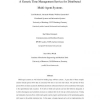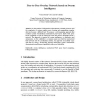1047 search results - page 111 / 210 » Learning the required number of agents for complex tasks |
AAI
2006
13 years 8 months ago
2006
Multi-agent systems are well suited for building large software systems. A great deal of these complex systems includes process flows that are concerned with time or are even time...
CVPR
2008
IEEE
14 years 10 months ago
2008
IEEE
Clustering is a fundamental task in many vision applications. To date, most clustering algorithms work in a batch setting and training examples must be gathered in a large group b...
AAAI
2010
13 years 4 months ago
2010
Some real-world problems are partially decomposable, in that they can be decomposed into a set of coupled subproblems, that are each relatively easy to solve. However, when these ...
ICANN
2009
Springer
14 years 2 months ago
2009
Springer
Backpropagation of errors is not only hard to justify from biological perspective but also it fails to solve problems requiring complex logic. A simpler algorithm based on generati...
ESAW
2009
Springer
14 years 2 months ago
2009
Springer
As the number of information in the Internet constantly increases and the complexity of systems rapidly grows, locating and manipulating complex data has become a difficult task. W...


